A Research Paper By Caryl Earwaker Luethy, Transformation and Resilience Coach, SWITZERLAND
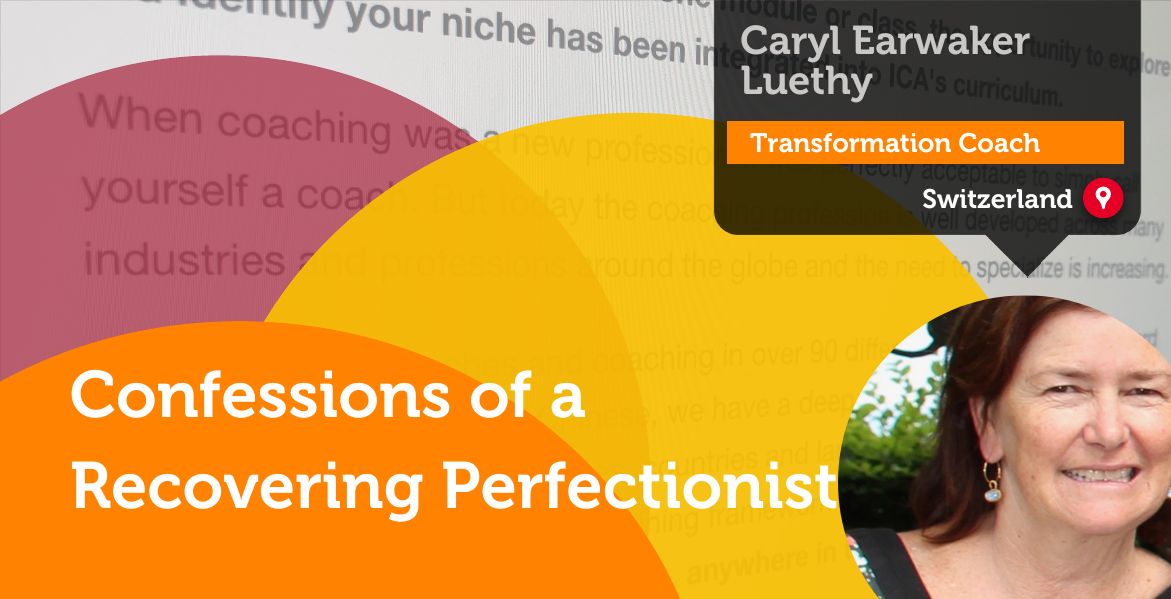
A Personal Case Study – The Cycle of Perfectionism

Perfectionism is everywhere – in epidemic proportions – if it was classified like our recent global epidemic, we could tick the checklist boxes, understand ourselves a lot better and take time to recover. Unfortunately being a Perfectionist is not that simple and is often a hidden disability.
Recently in a coaching session, there was a gentle and curious inquiry – “Would you consider yourself a Perfectionist?“. I very quickly and a little too emphatically (with an obvious rise in tone) replied “No, definitely not – I am pretty easygoing and am a positive, relaxed person – I don’t need to be perfect”. After some more curious questions and clarification of what a perfectionist really is – for the first time in my whole life, I realized that I am ranging from a soft to a hard-core Perfectionist. A rather large revelation at the time, which of course, as a recently self-professed Perfectionist, I went away and studied the topic intensively.
So, after taking several months and contemplating numerous directions with all of my three main ICA Coaching projects, I understood what was creating this feeling of being stuck –a personal ‘should’ masquerading as a desire to create a perfectly useful resource to carry me forwards with coaching. The problem was that in my desire to wait for the perfect solution, I was putting myself under a lot of pressure and getting overwhelmed with all of the ideas that were ping-ponging their way around my mind. I felt like I was living with my feet permanently off the ground – living in the future, not enjoying the present.
My Writers Block has finally been unhinged and the floodgates are open – I am definitely not an expert on the topic of perfectionism but alongside a lot of research, I have chosen to use my own story as a case study for a variety of reasons. This is a very new personal enlightenment that has given a very large and profound change in my perspective of how perfectionism can be an underlying issue in presenting problems. My experience and insights have literally made me feel lighter. I realize that these reflections and new insights may strike a chord with some readers, and hopefully deepen the understanding, normalize the perfectionist personality and build empathy for Perfectionists.
This Case study alongside the research for my Power Tool for ICA – Perfectionist versus Optimalist, has tuned my eyes, ears, heart, and soul into a different frequency and I have felt this Perfectionist theme popping up often in coaching and many other conversations.
So Who Is a Perfectionist?
The progress of our society has been supported over thousands of years by those who have gone beyond what is physically capable, to perform and find solutions that were only discovered because of their persistence for excellence and hard work. This striving in its positive form provides the foundation for much of the knowledge and beauty that we benefit from today. Famous perfectionists who made an incredible difference in the world include Steve Jobs and his influence on technology, and Michelangelo and his artistic works of brilliance.
In this personal Case study, we will look at how the cycle of perfectionism can emerge and be transformed from an Optimist to Recovering Perfectionist.
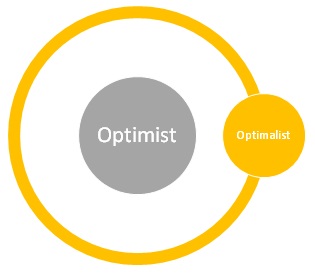
The Foundations of Perfectionism – From an Optimist to Optimalist
So how did I begin my journey into perfectionism? I had a wonderful childhood and grew up on a farm in a large family with loving parents. I had an excellent time at school and had many friends and fun hobbies. I was a pure Optimist and very positive about life and what it had to offer.
Only now with some intensive reflection, I realize the seeds for Perfection were sowed early on – my parents gave me a lot of encouragement and praise for working and playing hard and doing my best, alongside praise for achievements well done. Over the many years since that time, the praise proved useful and provided the drive to excel and also work hard to achieve results. I was a Perfectionist in the positive form – an Optimalist – a perfectionist working hard with realistic high goals and still having a balance in my life. I was able to set goals for my career and achieve them early on – achieving my ultimate career goal of teaching and inspiring others to become Teachers at a Higher Education Institution. I was passionate and taught about how Inclusion can be practiced in education. I had achieved my life purpose and found a deeper meaning in my life.
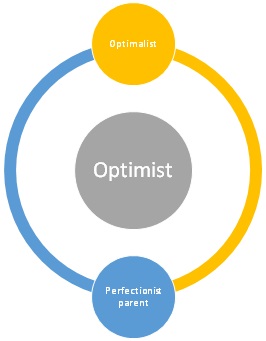
The Transition to Perfectionist Parent
Real Perfectionism did not set in till later when I became a parent – and in particular when our children were transitioning into young adults. When our children were born, I stopped working to become a full-time parent. Although I loved my new role as a parent, I lost my sense of self-worth from having a great respected job within the workplace. Relocating and living in a foreign country with a different language from when the children were young, further complicated matters. SoI carefully yet unwittingly went to work to replace my sense of self-worth by being the best Parent ever and giving all that I could to our children.
Our first child was born with an extra 21stchromosome, and I welcomed this challenge as I was perfectly set up with my special educational studies and work experience to welcome her into the world. I made sure she experienced inclusion throughout her education and was proud to be able to give her the best possible start in life. While both of our children were young, I was able to keep a lid on everything and life was reasonably in balance – I did a lot for the children, supported my aging mother, had my friends, and was active in the school and the local community. Although I supported both children to develop their strengths and interests, I focused on helping our child with Down Syndrome to shine academically, musically, physically, artistically, and socially. Having high expectations despite her intellectual difference has carried her well and she has had some incredible experiences already in her life journey. I enjoyed capitalizing on my personal strengths and was happy to have found my life purpose. Both of our children did a lot of activities out of school, had great friends, and still do well at school. I was an Optimalist, juggling all of my roles, helping our children both excel and doing a good all-round job with family and friends.
When our children started becoming young adults and developing their independence, the need for my support as a mother readily dwindled. This upcoming empty nest syndrome was a culture shock and over the last several years I tried a few different avenues for changes in my career in preparation for this time – each option never quite fitting the bill, and it has been a rollercoaster ride of the ups of following new ideas and the down’s when I realized that this was not the ‘right’ job.
The development of Perfectionism is a coping mechanism. At a certain point, by struggling to feel a sense of self-worth, I inadvertently started building a wall of self-protection. This coat of armor became like a hard shell to protect my dwindling and fragile sense of self-worth and I transformed from being an open-minded flexible thinker into developing rules with others to feel secure. I was struggling and slipped into wanting to have control where I could still feel some sort of self-worth. I started overshooting the previous high expectations to projecting my perfectionist tendencies and expectations, particularly onto our daughter. I had become a Perfectionist Parent.
The signs that I was expecting my child to be perfect:
- Difficulty watching her do something when she didn’t do it my way
- Micro-managing when she was working on a task
- Putting pressure on her to perform perfectly
- Finding self-worth based on my child’s achievements (Morin, 2021)
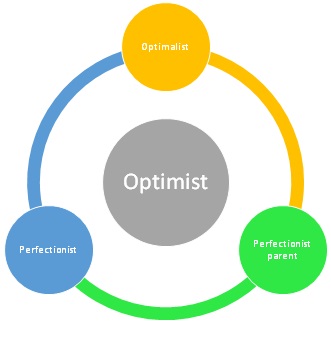
Transition to Pure Perfectionist
As I began to struggle to be the perfect parent, the perfectionist tendency spread its wings further and it became important and pretty much officially obsessive to make perfect decisions at all times. According to the Steps to happiness by the Guru of Positive Psychology – Martin Seligman, we can experience three kinds of happiness: pleasure and gratification; using our strengths and virtues; and finding meaning and purpose. As I had a dwindling life purpose from a lack of direction with my career and didn’t feel that I was using my strengths, I began to rely on pleasure as the key to my happiness.
I began to focus on finding the perfect family holidays. I spent way too much time searching for the best location, with the best accommodation and the best flight. Around the same time, we renovated our house and after many months, redecorated our bathroom. At the completion of the renovations, I was called away suddenly for a family funeral on the other side of the world. When I came back a couple of weeks later, I didn’t like the finished bathroom at all. We tore it out and from then on my perfectionist tendency went into overdrive and the fear of failure led to a disabling inability to make decisions, paralyzing procrastination, and a deepening of the rut of doubting myself-worth. I lost a lot of the confidence that I had always previously carried as an eternal Optimist and unwittingly slipped into being a pure Perfectionist.
One of my many analogies that have come through with this work is that being a Perfectionist is much like being a Circus Lion Tamer, the only problem being that we are cracking a whip and there is no lion in the cage, just ourselves….
Perfectionist traits that I experienced were:
- striving for perfection
- intense fear of failure
- procrastinating from making decisions
- agonizing over insignificant details
- constantly improving work
- being defensive of criticism
- being less resilient from setbacks
A full description of the traits of a Perfectionist is discussed more in-depth in my ICA Power Tool – ‘Perfectionist vs Optimalist’.
Just when I was really struggling, I discovered Coaching. I had tried a few different avenues for a career change as the children were becoming adults but nothing had resonated until then. Life coaching had always intrigued me since training as a counselor before having children. I wanted to channel my natural positive energy in a way that could be helpful for others to move forward. Coaching was a natural choice.
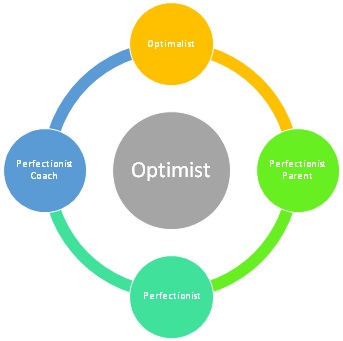
Implications for the Perfectionist Coach
The problem that I had for a long time within my coaching, is that I was totally unaware that I was still carrying the weight of perfectionism on my shoulders. I wanted each session to be perfect and anything less was readily labeled a bad session. This black-and-white thinking and consequent pressure to perform was crippling and any successful sessions were quickly forgotten when a session did not go well. I was overwhelmed by trying to incorporate all of the coaching skills, rather than having faith in trusting and following a simple process of coaching to build confidence. Getting lost in detail, overthinking, and over-analyzing were concepts that I struggled with on a daily basis. I was anxious and worried about how I would perform. Until this cloak of uncertainty and self-doubt could be thrown off, I was locked up in a cage of my own design. I had transitioned to a Perfectionist Coach.
I am so thankful to the Coach who challenged me with that one brave question in one session that changed the way my path unfolded. By realizing that I had become a Perfectionist, I could understand what was happening and what I wanted to do about it. It was very empowering.
Previously I had felt like a mouse that had been permanently chasing its tail, I finally realized that my tail was attached and I could let go. By remembering that coaching is all about the client being in the spotlight, I could drop my Director role and instead realize that my job is rather to provide the stage Lighting for the client. This change of perspective has lifted the pressure to perform and created a lightness in my coaching style.
I would recommend the Optimalist exercises that Ben Shahar designed to help coaches let go of perfectionism. He refers to them as PRP:
Permission – to remember that we are only human – we can give ourselves permission that not every session can be perfect
Reconstruction – learn the lesson from each session – reconstruct consequent sessions based on what worked and what not
Perspective – Look at the bigger picture – one session doesn’t matter
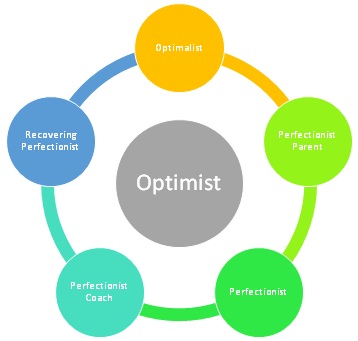
Letting Go as a Recovering Perfectionist
The world is continually changing and us all along with it. Having the alarm bell ring loudly and clearly in my life has been a brilliant experience. I have always said that ‘Every crisis is an opportunity in disguise – and now, after all, my natural optimistic view on life alongside a clear belief that everything happens for a reason has enabled a well-timed and appreciated a change in my life perspective. I am in transition as a Recovering Perfectionist and in a process of letting go.
Personally, I have always believed that imperfection is to be celebrated and it is totally liberating to have the shackles thrown off and to be free to be the me that I was before I had children. I am still in disbelief and wonder as to how far off-track I wandered in this last life transition.

I have come up with a few tips to help other perfectionists move through this transition in a grounded and resilient way.
Tips for Recovering Perfectionists
- By gathering knowledge and understanding the path to perfectionism, the first stepping stones toward freedom can be found
- You do not need to block out perfectionism – rather embrace those strengths with a realistic and balanced attitude – Accept the perfectionist self as part of the journey of learning. By accepting ourselves, we are more likely to be in the best mindset and heart-set to change (Ben – Shahar 2009)
- Step back and look at the bigger picture to find the path to freedom
- Adopt the ‘Good enough’ Mindset -by lowering the bar of expectations, we lower the pressure and can practice being satisfied with being ‘good enough. This brings more energy and through coping and learning increases self-confidence (Ben – Shahar, 2009)
- Experiment with being imperfect or dropping your standards
- As Perfectionists, we have a protective wall – we can free ourselves by breaking this wall down and connecting back up in the world.
- Resilience can be built up by making friends with the full range of our emotions– and giving ourselves permission to feel emotions rather than trying to fix them
- Stop, look, listen and learn – often in the rush to get to the finish line, we miss the learning
- Risk small failures – the most impactful way to deal with failure is by actually experiencing failure and living through it
- Reframe failure as data to help us learn
- Chip away at bigger projects with smaller, realistic steps
- Enjoy growth as a process, not a destination
- Celebrate your strengths and acknowledge your weaknesses as opportunities for growth
- Realize that mistakes are normal and learn from them
- Be softer – show compassion for yourself and others
- Let go of the all-or-nothing mindset
- Elasticity – get flexible and you will take the risk of bouncing back
- Share responsibility by asking for help, delegating, and empowering others
- Recognize effort as more important than achievement
- Let go of happiness being attached to an outcome –Live unconditionally
- Let go to find and accept your true self
- Find worth not through achievements but by simply being
- Develop a mantra that reminds you that you are worthy
- Find pleasure in the small things – practicing gratitude creates a great attitude
- Take time to celebrate your successes – you deserve it!
- Find support – we are not designed to be alone – as we seek to change, find others who are familiar with the challenges and/or willing to support
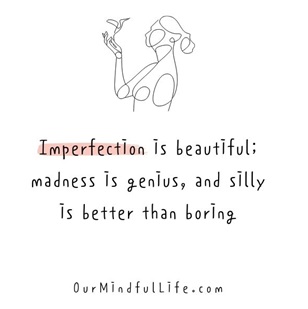
From writing this work around the topic of perfectionism, there have been an exceptionally large amount of ‘Aha!’ moments and it has been empowering to build an understanding of the essence of perfectionism. Basically, being a natural Optimist has carried me through all of these different stages and I am excited about the future and the transformation from recovering Perfectionist to returning around the full cycle back to being an Optimalist. Older, at times wiser, proud to be imperfect, open, reflective, and free of the shackles of ego.
By being free to be me – authentically imperfect, I hope that I can inspire clients along their journey to let go of being a Perfectionist as a Recovering Perfectionist, with the longer-term goal of becoming or returning, to being an Optimalist.
References
Ben-Shahar, Tal. 2009 The Pursuit of Perfect
Ben-Shahar, Tal. www.wordola.com Optimalist Exercises
Grande, Diane. 2021 www.psychologytoday.com When Perfection harms you or your relationships
Holuk, Cathy. 2016 Understanding Perfectionism and its Implications to the Coaching Experience
Horne, Amanda. 2009 Permission to be an Optimalist
Morin, Amy. 2021 www.verywellmind.com What to know about Perfectionist Parenting
Olender, Amanda. 2019 ‘Perfectly Imperfect – Breaking Free of Perfectionism ‘
Wilding, Melody. 2021 www.psychologytoday.com 3 Types of Perfectionism to watch out for
Photos
Psyblog2016 www.spring.org.uk Top 10 Secret Signs of a Perfectionist